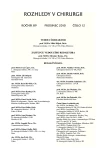Video-Assisted Esophageal Resection for Carcinoma – Ten-Year Experience
Authors:
R. Aujeský; Č. Neoral; V. Král; R. Vrba; K. Vomáčková
Authors‘ workplace:
I. chirurgická klinika LF UP a FN Olomouc, přednosta: doc. MUDr. Č. Neoral, CSc.
Published in:
Rozhl. Chir., 2010, roč. 89, č. 12, s. 746-749.
Category:
Monothematic special - Original
Overview
Introduction:
Esophageal procedures belong to the most complicated gastrointestinal procedures. Therefore, esophageal carcinoma patients have been and still are concentrated into specialized centres, equipped with all diagnostic and therapeutic means. At the Ist Surgical Clinic of the LF UP (Medical Faculty of the Palacky University) in Olomouc, esophageal surgery has a long lasting tradition. In the management of malignant esophageal disorders, the clinic prefers the use subtotal esophageal resection , attaching the esophagus transplant to a cervical esophageal stud, to the use of more saving resection with the anastomosis site in the mediastinum. In order to subsitute for the resected esophagus, the authors normally use a tubulized gastric flap. In cases, where the stomach cannot be used, the authors use transverse colon to replace the resected esophagus. Classical esophageal procedures have nearly entirely been replaced by video-assisted procedures. Most esophageal resections are performed using video-assisted laparoscopic transhiatal approach. In the management of esophageal tumors which are located at the level of tracheal bifurcation, or below it, the authors use right - sided thoracoscopic approach.
Material and Methods:
During the past 10 years, 178 patients have undergone subtotal esophageal resection for esophageal carcinoma. In 81 patients (45.5%), the esophagus was resected using classical approach. 35 subjects underwent transhiatal „blind“extirpation according to Orringer, in 46 subjects right-sided thoracotomy was used (subjects with tumors located in the middle third of the thoracic esophagus and higher). Video-assisted approach was used in 97 patients, which included 88 subjects with laparoscopic transhiatal modification of the procedure and 9 subjects, who underwent video-thoracoscopy.
Outcomes:
The mean procedure duration was 242 minutes. The authors recorded the following complications: pneumothorax in 29 patients (16%) and n. laryngeus recurrens palsy in 16 subjects (9%). 13 patients (7%) developed a fistule in anastomosis, which was managed by drainage of the cervical wound. Pulmonary complications were recorded in 55 patients (31%). The mean duration of hospitalization was 12 days, intraoperative death rate was 4.5%. Only 2 out of 8 deaths occurring during the early postoperative period, were surgery-related. In the both cases, mediastinitis developed, resulting from a transponate necrosis in one of the cases and from a bronchial fistule in the other subject. Five subjects exited because of ARDS, which included one case of myocardial infarction.
Conclusion:
When esophageal carcinoma is managed at a clinic equipped with the latest modern diagnostic and theraputical means, the procedure of esophageal resection is a fairly safe procedure with low death and morbidity rates.
Key words:
esophageal carcinoma – video-assisted resection – esophago-gastroplasty
Sources
1. Akiyama, H., Miyazomo Use of the stomach as an esophageal substitute. Ann. Surg., 1978, 188 : 606–610.
2. Fok, M.,. Cheng, S. W. K, Wong, J. Pyloroplasty Versus No Drainage in Gastric Replacement of the Esophagus. Am. J. Surg., 1991, 162 : 447.
3. Králík, J., Aujeský, R., Neoral, Č., Folprecht, M. Dlouhodobé sledování kolon jako náhrady jícnu. Čs. Gastroenterol. Výž., 47, 1993, No. 5, 243–247.
4. Sabanathan, S., Shah, R., Mearns, A. J., Richardson, J., Goulden, C., Shakir, T. Results of surgical treatment of oesophageal cancer. J. R. Coll. Surg. Edinb. (ENGLAND), Oct 1996, 41 (5), p. 295–301.
5. Wong, J. Esophageal Resection for Cancer: The Rationale of Current Practise. The American Journal of Surgery, Vol. 153, January 1987, p. 18–22.
6. Král, V., Neoral, Č., Aujeský, R. Přednosti a nedostatky krční anastomózy jícnu šité pomocí staplerů. Rozhl. Chir., 74. 1995, No. 8, 438–440.
7. Bolton, J. S, Sardi, A., Bowen, J. C, Ellis, J. K. Transhiatal and transrhoracic esophagectomy: comparative study. J. Surg. Oncol. 1992; 51 : 249–253.
8. Fok, M., Law, S., Stipa, F. et al. A comparison of transhiatal and transthoracic resection for oesophageal carcinoma. Endoscopy, 1993; 25 : 660–663.
9. Aujesky, R., Neoral, C., Kral, V., Bohanes, T., Vrba, R., Vomackova, K. Video-assisted laparoscopic resection of the esophagus for carcinoma after neoadjuvant therapy. Hepato-Gastroenterology, 2009 Jul-Aug; 56(93): 1035–1038.
10. Ishida, K., Koeda, K., Sato, N., Ikeda, K., Ohtsuka, K., Aoki, K., Kimura, Y., Iwaya, T., Uesugi, N., Nakamura, R. Problems in neoadjuvant chemoradiotherapy preceding surgery for advanced squamous cell carcinoma of the thoracic esophagus. Jpn. J. Thorac. Cardiovasc. Surg., 1999 Jun; 47(6): 262–266.
Labels
Surgery Orthopaedics Trauma surgeryArticle was published in
Perspectives in Surgery

2010 Issue 12
- Possibilities of Using Metamizole in the Treatment of Acute Primary Headaches
- Metamizole at a Glance and in Practice – Effective Non-Opioid Analgesic for All Ages
- Metamizole vs. Tramadol in Postoperative Analgesia
-
All articles in this issue
- Rare Umbilical Anomalies
- Potential of Endoscopic Microsurgery
- Ambulatory Excision of Perianal Duplicatures
- Patient Survival Following Radiofrequency Ablation of Liver Metastases from Colorectal Cancer
- XLIF – A New Technique of the Lumbar Vertebra Replacement: Initial Experience
- Radical Procedures in Patients with Pancreatic Cancer – Impact on Prolongation and Quality of Life
- Pancreatic Cancer Surgery at Ist Surgical Clinic of the Olomouc Faculty Hospital (FN Olomouc)
- Esophageal Replacement Using Large Intestine – Experience with 109 Cases
- Video-Assisted Esophageal Resection for Carcinoma – Ten-Year Experience
- Solitary Fibrous Tumor of Pleural Cavity
- Risk of Colorectal Carcinoma in a Patient with Ulcerative Colitis
- An Original Reconstruction of Stomach after Gastrectomy for Cancer
- Perspectives in Surgery
- Journal archive
- Current issue
- About the journal
Most read in this issue
- Rare Umbilical Anomalies
- Ambulatory Excision of Perianal Duplicatures
- Solitary Fibrous Tumor of Pleural Cavity
- XLIF – A New Technique of the Lumbar Vertebra Replacement: Initial Experience
